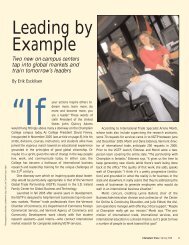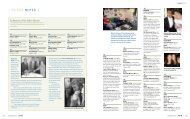You also want an ePaper? Increase the reach of your titles
YUMPU automatically turns print PDFs into web optimized ePapers that Google loves.
Common Ground:Who is an American?US Border/Immigration DialogueIn addition toparticipating incultural simulations,students in LEADfacilitate structureddialogues on a rangeof current issues.The rate of immigration is too rapid.Are we in danger of losing our“American” identity?Immigrants offer far more tosociety than they take from it.Should all newcomers bewelcomed?Immigrants strain the public purseand compete for jobs.Should we restrict the number ofnewcomers we allow into thecountry?Tuesday, October 21 st - 6PM Hauke 103Participation fulfills credit for LEAD 201.Signups with your Peer Advisor are strongly encouraged.As Averill notes, first-year students are participating fully inLEAD’s required activities. But are they perceiving the benefits?Not all of them. “When I first heard about [LEAD], it struckme as forced volunteering,” Nate Converse ’12, a SoftwareEngineering major from Hamden, Massachusetts, says. “It seemsthat it has a good spirit to it, but if you make people do that,what’s the point?”If Averill is not thrilled about such criticism, she knows howto put it in perspective. “Like FYS [First-Year Seminar], for the14 years that that was in place,” she says, “a large group of themwould complain, [but] when you caught them in their junioryear, they would say how helpful it actually was. It’s a programthat I don’t believe all students will recognize the helpfulness ofuntil a couple years later.”For now, she chooses to view LEAD’s successes along with itschallenges. “Our first hurdle was to ask if it was even feasible toget 100 percent participation,” she says, “especially when you’renot giving them a grade. Now that we know we can, we’re goingto build.”Even outspoken critics like Converse find some good inLEAD. “I guess it is good to get students involved with thecommunity, so it’s not all bad,” he says, adding that a few hoursof LEAD activity a month is “not bad at all.”The Big PictureGoldsweig, Averill, and their colleagues are excited to see LEADin action. A full appreciation of what the program stands toaccomplish, however, calls for a broad perspective on what ameaningful life may look like for today’s college students, asLEAD’s scope is wide. “LEAD is about life skills,” Averill says,“from being able to read a credit report ... to understanding yourrole as a person who lives in a democratic country, from veryassessable skills—Can you balance this checkbook? Can you readthis credit report?—to being able to converse with someone whohas a very different outlook and perspective.”As Finney reflects on LEAD’s first year in progress, hesees the opportunity to develop such diverse skills as both avalue-added component of their <strong>Champlain</strong> experience and anundertaking with serious implications for students’ success in theglobal economy. “Many schools call themselves career schools,”he says. “When you scratch beneath the surface, what they meanis that their students tend to get employment in entry-levelpositions. If we’re going to be a career-oriented institution—andbe serious about it—the bar has to be set a lot higher, becausecareer is life.”For Goldsweig, whose experience in designing studentlifeinitiatives at <strong>Champlain</strong> <strong>College</strong> extends back some threedecades (see “Steady as She Goes” on page 18), LEAD amounts totaking to the proverbial “next level” what the <strong>College</strong> has longdone. “We’ve always understood that students were more thantheir traditional courses, that we owe students more than justsitting in a class,” she says. “What we’re doing now has an overallintentionality that I think we didn’t have before. This is startingwith a big plan and then making sure that the activities that weoffer fit within that plan…Of course, we want students to likethe activities, but this is bigger than that.”Way bigger. As Finney notes, LEAD attempts to instill instudents not merely skills to meet professional challenges sure togreet them one day soon, but a deeper sense of how they’d liketo live their lives. “I think we’re obligated, as educators, to tryand prepare students for the life that they’ll live,” he says, “andto reflect on what they want that life to be and what values willdrive them … to think deeply about who they are and what theywant to accomplish in life.”It’s a tall order, Averill knows, one that will require vigilanceand, above all, patience. “Teaching students how to be successfulcitizens in the world,” she adds, “is not a little task. It’s notsomething that can be created overnight.” 114 <strong>Champlain</strong> View | Spring 09











